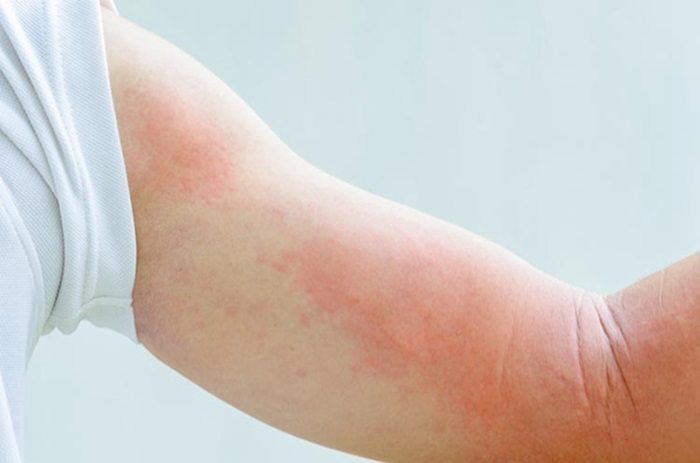Vasodilation
When you take a hot bath, the heat causes the blood vessels in the skin to dilate. This is a normal physiological response as the body tries to dissipate the heat and regulate its temperature. Vasodilation allows more blood to flow to the skin’s surface, which can lead to redness and a feeling of warmth. In some individuals, this increase in blood flow can trigger an allergic – like reaction. The dilated blood vessels may release substances such as histamine.
Histamine is a key player in the development of hives. It causes the blood vessels to become more permeable, allowing fluid to leak out into the surrounding tissues. This fluid accumulation leads to the characteristic swelling and raised appearance of hives. The release of histamine can be a direct response to the heat – induced changes in the blood vessels or it can be part of an underlying hypersensitivity reaction.
Sweat and Skin Irritants
Hot baths can cause sweating, and sweat contains various substances such as salts, urea, and other metabolites. In some people, these substances can act as irritants to the skin. Additionally, the combination of heat and sweat can disrupt the skin’s natural barrier function. The skin’s outermost layer, the stratum corneum, is designed to protect the body from external factors. When this barrier is compromised, it becomes more vulnerable to irritation and the development of hives.
Moreover, the products used during a bath, such as soaps, bath oils, or bubble baths, can interact with the heat and sweat. Some of these products may contain ingredients that are potential allergens or irritants. For example, fragrances, preservatives, or certain surfactants in soaps can cause an allergic reaction when the skin is already in a sensitized state due to the heat.
Underlying Allergic or Hypersensitivity Reactions
Heat – Induced Allergies (Cholinergic Urticaria)
Some individuals have a specific type of hives known as cholinergic urticaria, which is triggered by heat, exercise, or stress. In this condition, the body’s immune system overreacts to the release of acetylcholine, a neurotransmitter that is involved in the body’s response to heat and sweating. When a person with cholinergic urticaria takes a hot bath, the increase in body temperature leads to the release of acetylcholine, which then sets off an allergic reaction.
The immune system responds by releasing histamine and other inflammatory mediators. The hives that develop can be small, itchy bumps that may cover a large area of the body. The severity of the reaction can vary from person to person. Some may experience only a few hives, while others can have a more widespread and intense outbreak.
Pre – Existing Allergies and Sensitivities
A person may have pre – existing allergies to substances that are more likely to interact with the skin during a hot bath. For example, if someone is allergic to certain types of fabrics and uses a towel made from that material after a bath, it can trigger hives. Similarly, an allergy to a particular type of water treatment chemical (such as chlorine in tap water or a water softener chemical) can become more pronounced when the skin is warm and more permeable due to the hot bath.
Even food allergies can play a role. In some cases, a person may have a mild allergic reaction to a food they consumed earlier, and the heat from the bath can exacerbate the symptoms and lead to the appearance of hives on the skin.
Other Factors
Stress and the Immune System
Stress can have a significant impact on the immune system and the skin’s reactivity. Taking a hot bath is often a relaxing activity, but for some people, it can also be a source of stress, especially if they have had previous experiences of hives after bathing. The stress – induced changes in the immune system can make the skin more prone to developing hives.
The body’s stress response can lead to the release of hormones such as cortisol, which can interact with the immune system and inflammatory pathways. In a stressed state, the body may have a reduced ability to regulate the release of histamine and other inflammatory mediators, increasing the likelihood of hives formation after a hot bath.
Genetic Predisposition
There may be a genetic component to the development of hives after a hot bath. Some individuals may have a genetic makeup that makes their skin more sensitive to heat or more likely to mount an allergic – like response. For example, certain genetic mutations can affect the function of the skin’s mast cells, which are the cells that release histamine. If these mast cells are more reactive due to genetic factors, it can increase the chances of hives appearing after exposure to heat.
Conclusion
The appearance of hives after a hot bath can be due to a combination of factors including the skin’s physiological response to heat, underlying allergic or hypersensitivity reactions, stress, and genetic predisposition. If hives occur frequently after hot baths, it’s important to consult a healthcare provider. They can help identify the underlying cause through allergy testing and other diagnostic methods and provide appropriate treatment and advice to manage and prevent future outbreaks.
Related topics
What Causes Hives Rash in Adults?
Stress Hives: Causes, Duration& Management


